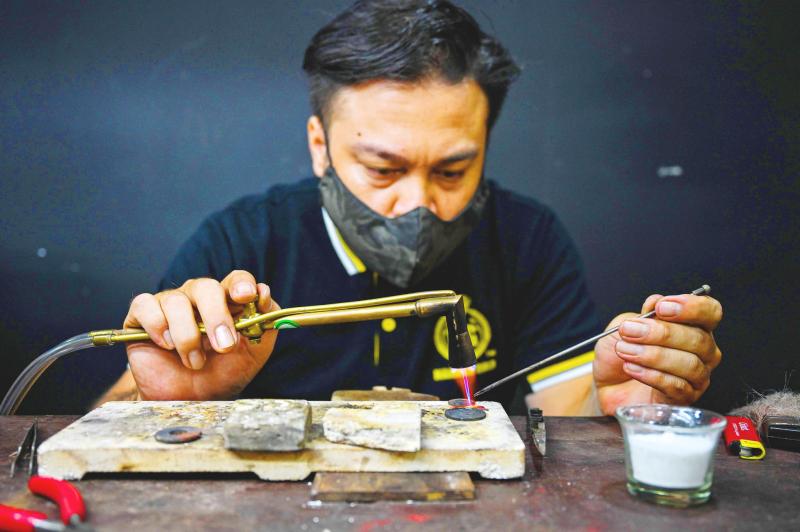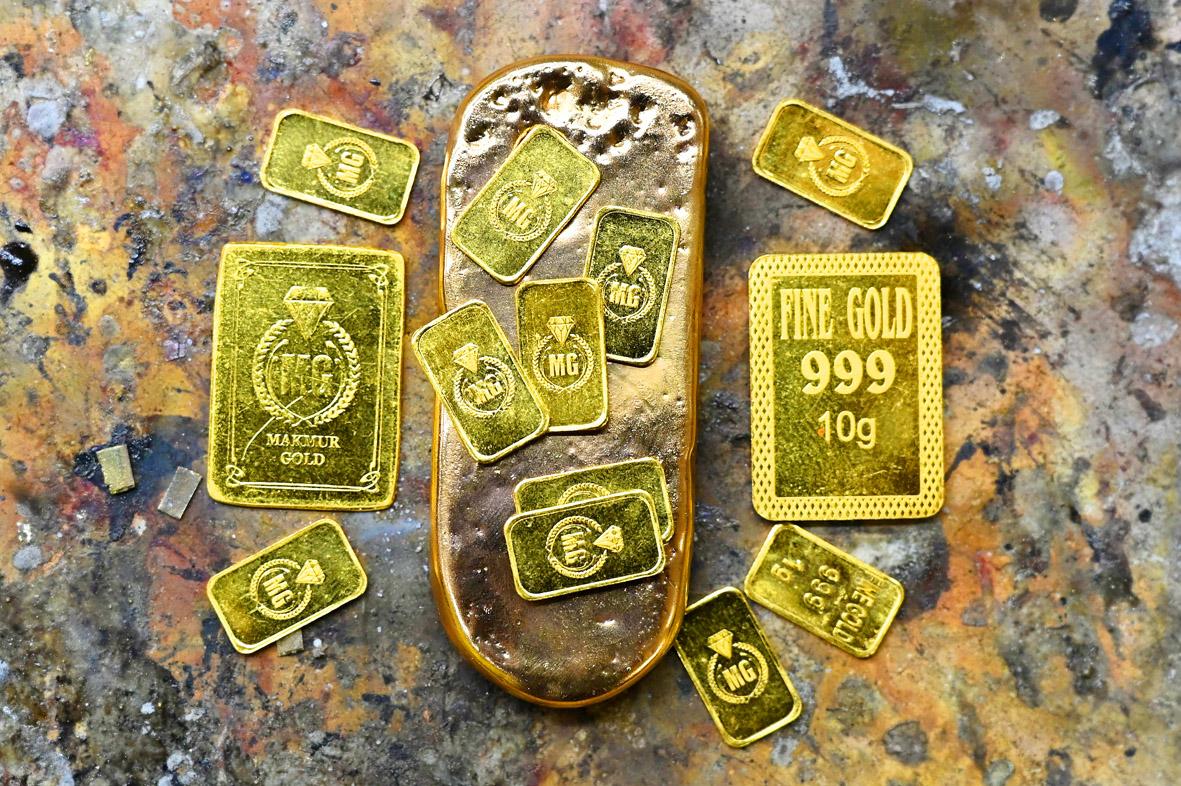In a backroom workshop in Malaysia, goldsmiths with blowtorches and chisels sit at wooden desks as they melt and mold the precious metal into glittery jewelry.
Demand for the safe-haven commodity has soared during the COVID-19 pandemic, and it is not only professional investors who are cashing in, but small businesses, too.
The Makmur Gold Co, which is based in northern Kelantan state and mainly makes jewelry, has enjoyed brisk business this year even as the Southeast Asian nation’s economy fell into recession.

Photo: AFP
“We’ve seen good developments — during COVID-19, our sales were much better,” company director Muhammad Nur Hisyam Che Mahmood said.
Gold surged this year as the pandemic accelerated and stock markets tumbled, hitting a record above US$2,000 an ounce in August, although it has since slipped back to about US$1,800.
Makmur Gold recorded strong sales of about 80 million ringgit (US$19.7 million) over the past eight months as buyers sought to park their cash somewhere safe.

Photo: AFP
The business sells goods directly to customers from its four outlets as well as online, offering items ranging from bracelets and rings to small gold bars. Most of its gold is sourced in the form of jewelry from a small number of suppliers in the country or bought second-hand from customers, before being melted down and fashioned into new products.
In addition to regular customers, the business has agents who sell on its behalf and then keep a share of the profits.
One such agent is Tuan Zubaidah Tuan Abdul Rahman, who made 500,000 ringgit in sales during three months of buying and reselling gold jewelry part-time.
“People are seeing that rather than hold on to their money in the bank, it is better for them to buy gold,” said the woman, who is also a teacher. “People can wear it, and it can be a valuable asset.”
Nurse Nor Fazilah Jamaludin said that she sold gold jewelry during the pandemic to increase her income.
“Women will buy these for beauty, but the benefit of buying gold is more toward our investment for the future,” she said.
Malaysians began rushing to buy gold in May as authorities allowed businesses to reopen after a six-week COVID-19 lockdown, Federation of Goldsmiths and Jewellers Associations of Malaysia president Steven Siow said.
People had extra cash after not spending much for a while and due to a six-month government moratorium on repaying loans aimed at boosting the economy, and gold shops doubled or even tripled their sales, he said.
The gold price has slipped as hopes rise that vaccines are to be rolled out soon, but experts believe that the world economy faces a bumpy recovery and the precious metal is likely to remain a safe bet for some time.
“Gold, in any crisis, would be the key asset to look out for,” said Yeah Kim Leng, an economics professor at Sunway University Business School.

GEOPOLITICAL ISSUES? The economics ministry said that political factors should not affect supply chains linking global satellite firms and Taiwanese manufacturers Elon Musk’s Space Exploration Technologies Corp (SpaceX) asked Taiwanese suppliers to transfer manufacturing out of Taiwan, leading to some relocating portions of their supply chain, according to sources employed by and close to the equipment makers and corporate documents. A source at a company that is one of the numerous subcontractors that provide components for SpaceX’s Starlink satellite Internet products said that SpaceX asked their manufacturers to produce outside of Taiwan because of geopolitical risks, pushing at least one to move production to Vietnam. A second source who collaborates with Taiwanese satellite component makers in the nation said that suppliers were directly

Top Taiwanese officials yesterday moved to ease concern about the potential fallout of Donald Trump’s return to the White House, making a case that the technology restrictions promised by the former US president against China would outweigh the risks to the island. The prospect of Trump’s victory in this week’s election is a worry for Taipei given the Republican nominee in the past cast doubt over the US commitment to defend it from Beijing. But other policies championed by Trump toward China hold some appeal for Taiwan. National Development Council Minister Paul Liu (劉鏡清) described the proposed technology curbs as potentially having

EXPORT CONTROLS: US lawmakers have grown more concerned that the US Department of Commerce might not be aggressively enforcing its chip restrictions The US on Friday said it imposed a US$500,000 penalty on New York-based GlobalFoundries Inc, the world’s third-largest contract chipmaker, for shipping chips without authorization to an affiliate of blacklisted Chinese chipmaker Semiconductor Manufacturing International Corp (SMIC, 中芯). The US Department of Commerce in a statement said GlobalFoundries sent 74 shipments worth US$17.1 million to SJ Semiconductor Corp (盛合晶微半導體), an affiliate of SMIC, without seeking a license. Both SMIC and SJ Semiconductor were added to the department’s trade restriction Entity List in 2020 over SMIC’s alleged ties to the Chinese military-industrial complex. SMIC has denied wrongdoing. Exports to firms on the list

TALENT FACTOR: The nation’s chip sector would be difficult to replace, but to maintain that advantage, Taiwan must retain skilled workers, an academic said A group of experts on Sunday called on Taiwan to strive to maintain its world-leading position in the semiconductor industry, with a US-China chip dispute expected to continue regardless of who becomes the next US president. Tamkang University Graduate Institute of International Affairs and Strategic Studies director Li Da-jung (李大中) said at a Taipei seminar on global semiconductor security that the relationship between the two superpowers would remain confrontational. There appears to be “no turning back” in US-China relations, as US presidential candidates US Vice President Kamala Harris and former US president Donald Trump are both expected to continue Washington’s hawkish stance